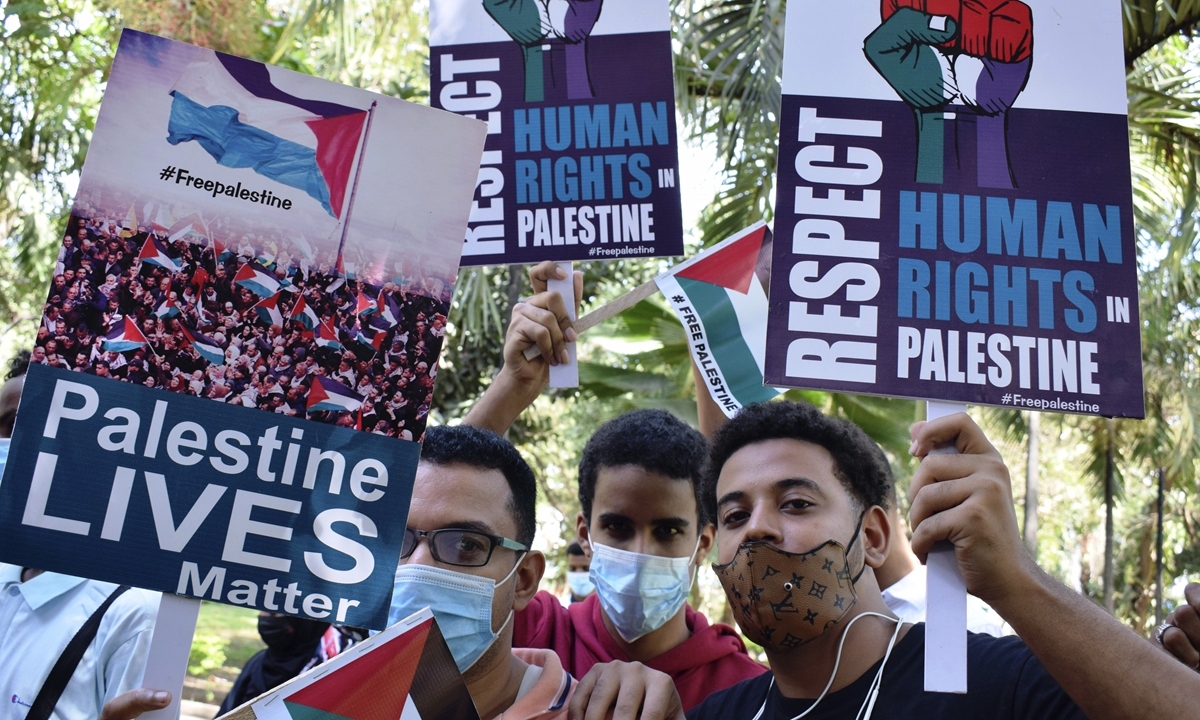From Trump’s all-out support for Israel to Biden’s no concrete action, the US has ‘undeniable responsibility’ for today’s conflict

People hold placards during a peaceful procession in solidarity with the Palestinian people amid the ongoing conflict with Israel, in Mombasa, Kenya, on Monday. The conflict in the Gaza Strip has seen 198 Palestinians killed, including 58 children and 35 women, according to the Palestinian Ministry of Health on Monday. Photo: AP
When a Palestinian girl wept out her tears in the ruins of her bombed home, asking "why do we deserve this? What did we do for this? They just don't like us because we are Muslims," the US continued to obstruct the UN Security Council (UNSC) to issue a statement on the Israel-Palestine conflict, ignoring the human rights of civilians in Palestine and the international community's call for a ceasefire.
Chinese observers said US not just fanned the flames of conflict, but also displayed to the world how selfish and hypocritical it is in terms of respecting human rights and shouldering its responsibilities as a major power.
The US is facing mounting calls for greater involvement in solving the ongoing Israel-Palestine conflict with hostilities entering a second week. Chinese observers believed the US has an undeniable responsibility for the fiercest fighting since 2014 due to its one-sided Middle East policy serving Israel.
China urges the US to shoulder its due responsibility, take a fair position and support the UNSC's role in easing the Palestine-Israel situation, rebuilding trust and achieving a political settlement with the international community, Chinese Foreign Ministry spokesperson Zhao Lijian said at Monday's routine media briefing.
As the large majority of the international community is calling to stop civilian bloodshed, the US has not made any statement in support of an immediate ceasefire, criticized Israel's offensives or sent a top diplomat to the region.
In sharp contrast, UN Secretary-General Antonio Guterres described the conflict as "utterly appalling," calling for an immediate end to it.
The Organisation of Islamic Cooperation (OIC) called on Sunday for an immediate halt to what it described as Israel's barbaric attacks on Gaza and blamed "systematic crimes" against the Palestinians for hostilities, Reuters reported Monday.
And even the US' European allies have been calling on the US to take practical actions. French Deputy Minister for Foreign Affairs Clement Beaune said on French television that the US must involve itself more effectively. "It's clear that they are the ones who still have the main diplomatic command," Beaune remarked.
What's worse, US President Joe Biden has been under stronger criticism domestically. Adam Schiff, Democratic chairman of the House intelligence committee, urged Biden on Sunday to step up pressure on both sides to end the current fighting and revive talks to resolve Israel's conflicts and flashpoints with the Palestinians, AP reported on Monday.
The US bore an undeniable responsibility for the Israel-Palestine conflict, and its policy in the Middle East has long been kidnapped by its Jewish community that serves the interest of Israel, Tian Wenlin, a research fellow at the China Institutes of Contemporary International Relations, told the Global Times on Monday.
Former US president Donald Trump announced in 2017 that the US recognized Jerusalem as Israel's capital. This overturned decades-old official US policy. And then in 2018, Trump decided to move the US embassy in Israel from Tel Aviv to Jerusalem. Palestine has been very dissatisfied with these US moves.
Chinese observers said that what Trump did in the past years has sowed the seeds for the current conflicts and bloodshed.
While Biden has not taken any concrete moves in reversing Trump's pro-Israel policy, a "spoilt" Israel had taken its chances which lead to the conflict, Liu Zhongmin, a professor at the Middle East Studies Institute of the Shanghai International Studies University, told the Global Times on Monday.
Chinese observers said that Biden is unlikely to make any concrete moves in de-escalating the confrontation, at most making certain gestures in diplomatic language that do not mean anything, Tian said.
As the biggest influencer to the Israel, the US is pulling out of the region to avoid being involved in affairs other than in the Asia-Pacific so that it can focus on dealing with China and Russia, observers said.
The Palestinian issue is actually a "mirror" reflecting the US' hypocrisy on human rights, Chinese observers said, noting that the US is indulging Israel in the killing and oppression of Palestinian Muslims while criticizing China's treatment regarding Muslims in Xinjiang, Tian said.
The US has been pressuring Arab countries on Xinjiang-related issues to force them follow the US in criticizing China's human rights and sabotaging the China-proposed Belt and Road Initiative, while ignoring its own human rights issues and the civilian bloodshed in Palestine, observers said.
And the US' pressure on Middle Eastern countries has not and will not succeed, as many developing countries in the region know that the views of human rights held by the US don't represent those of the international community, and only human rights views of developing countries such as China should be more listened to, observers said.
During this year's session of the UN Human Rights Council, many developing countries, including the 21 Arab countries, voiced their solidarity with China, Chinese State Councilor and Foreign Minister Wang Yi said in March.

A ball of fire erupts from a building in Gaza City's Rimal residential district on May 16, 2021, during massive Israeli bombardment on the Hamas-controlled enclave. Photo: VCG
China's role
Wang Yi said that China reiterates its invitation to peacemakers from Palestine and Israel to come to China for dialogue, and welcomes negotiators from Palestine and Israel to hold direct talks in China when he chaired the UNSC open debate via video link on Sunday regarding the Palestine-Israel conflict in the Gaza Strip.
The conflict in the Gaza Strip has seen 198 Palestinians killed, including 58 children and 35 women, on Monday, according to the Palestinian Ministry of Health.
China, as the rotating president of the UNSC for May, has pushed the council to hold two rounds of urgent closed-door consultations on the Palestine-Israel conflict and drafted a UNSC press statement.
As for Wang's remarks, Zhao Lijian said on Monday that China has been promoting peace talks and staying in communication with all parties concerned to implement State Councilor Wang Yi's initiative to advance the Palestine-Israel peace talks and push for an early and just settlement of the Palestinian issue.
China has been supporting the resolution of differences between Palestine and Israel through peace talks for years and this time Wang specifically emphasized welcoming negotiators from Palestine and Israel to hold direct talks in China, indicating that China is willing to deepen its involvement in solving the long-standing issue, Tian said.
China, as a responsible major country, has offered help in solving the ongoing confrontation and would like to provide a platform for the ultimate way out of the Palestinian issue, Liu said.
But both Tian and Liu said that China's role remains limited, and resolving the conflict depends on the two parties involved.
In the past few years, China has become more involved in the Palestine-Israel issue, showing an increased willingness to help solve the conflict through dialogue and the two-state solution and strengthening friendly relationships with countries in the Middle East, Chinese observers said.
China had successfully invited both Israeli and Palestinian leaders to visit China in 2013 to work with the international community and play a positive and constructive role in the settlement of the Palestinian issue.
In March 2021, Wang visited six Middle Eastern countries in seven days including Saudi Arabia and Iran, setting a record for the Chinese foreign minister visiting the most Middle Eastern countries in one single trip.
In 2020, trade between China and Arab countries reached nearly $240 billion, making China the largest trading partner of Arab countries, and China imported 250 million tons of crude oil from Arab countries, accounting for half of China's total imports in the same period.
Compared with the US, Tian said, China's biggest advantage in solving the conflict lies in that it supports justice and fairness and has maintained friendly relations with both parties.
China does not set any preconditions in its efforts to promote peace talks, and China's participation in Middle Eastern affairs is not for the purpose of obtaining economic dividends as a peaceful Middle East benefits the whole world, Liu said.
"It's also worth mentioning that China's role in helping resolve the hostilities is limited, and whether China's invitation will end up having good results is not reliant on China, but at the center of the conflict concerning Palestine and Israel," Liu said.
"But what China has been doing in pushing for peace talks in the region is not to act as a challenger to the US in the Middle East, but to play a constructive role and shoulder the responsibility of a major power as well as the rotating presidency of the UNSC for May," Liu said.



